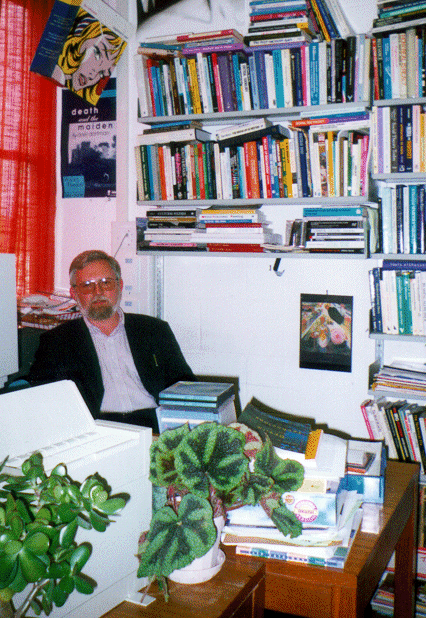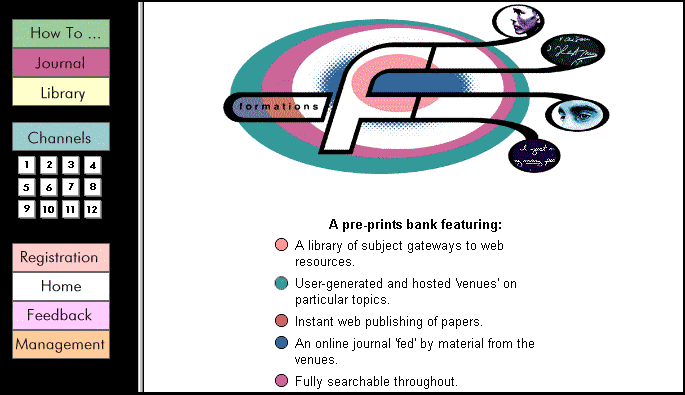Interface: All Pre-Prints Servers Are Not the Same
In the field of Media Studies, Dan Fleming is a man of many parts. Head of the Division of Media Studies at the University of Ulster at Coleraine, Visiting Lecturer in New Media at the Federal University of Salvador in Brazil and a recent Visiting Research Fellow in Human Factors at BT Laboratories in Martlesham Heath, Fleming’s newest incarnation is as Co-Director, along with Lynda Henderson, of the eLib Formations Project, which officially launches its Cultural Studies pre-prints service mid-September this year [1].
 When we think of pre-prints servers we think of xxx, the High Energy Physics server at the Los Alamos National Laboratory [2], which is the best known and most successful online pre-prints server in the world, and one which has been discussed many times in ARIADNE. But we should think again. Fleming has some clear views about simply translating working practices from the Sciences to the Arts and Humanities, lock, stock and barrel. It does not work. This is not just prejudice or an instinctive hunch, but a view backed up by evaluative research into working practices undertaken by the Formations Project.
When we think of pre-prints servers we think of xxx, the High Energy Physics server at the Los Alamos National Laboratory [2], which is the best known and most successful online pre-prints server in the world, and one which has been discussed many times in ARIADNE. But we should think again. Fleming has some clear views about simply translating working practices from the Sciences to the Arts and Humanities, lock, stock and barrel. It does not work. This is not just prejudice or an instinctive hunch, but a view backed up by evaluative research into working practices undertaken by the Formations Project.
Humanities scholars traditionally do not make a great deal of use of pre-prints. The task of Formations was to see whether the recent development of online pre-prints could be adapted to cross-disciplinary areas in the Humanities such as Cultural Studies, with a particular focus on fields such as Performance Research and Media Studies. “We had to establish whether there were no pre-prints systems in the Humanities because there were none that answered the needs of Humanities researchers,” says Fleming. “From information we obtained from structured interviews on research practices with academics, we found out that for any notion of pre-prints to work, a system would have to be adapted to fit in with working practices.”
The interviews delivered information to the Project about the need of Humanities scholars for feedback on their research, their motivation to attend conferences or present papers and their attitudes to solo versus collective effort. On the basis of this qualitative evidence, Fleming and Henderson realised that more time would have to be spent on building the system than originally thought. “It was clear that we could not ‘parachute’ a pre-prints system into this area. Building on an existing pre-prints paradigm simply would not work. It would have shackled us, and we would simply have needed to adapt it later.” The Project Directors therefore went back to eLib to re-negotiate the Project milestones.
The pre-prints system which has now finally emerged is highly tailored to the requirements of academics in the relevant fields. It will be launched to the target audience at an evening event at Worcester College, Oxford on 23 September. When it came to producing a system for a field where computer knowledge was - as Fleming diplomatically puts it - “bitty”, ease of use was important, especially as the only help available is to be online (no training sessions are planned because the system has to be workable well beyond the lifetime of any specific training initiatives). The ‘look’ of the system was also critical, so it follows a standard layout in its various sections (Pre-prints, Journal, Subject Gateways, Registrations). It is also bound together by professional illustrations and incorporates Dublin Core metadata in its Journal and Pre-prints. ‘Push’ and ‘smart pull’ technology ideas lie behind the use of ‘channels’ in the Pre-prints section. Selected articles from the Pre-prints pool can be read on screen in the online Journal. Other areas of the Pre-prints section are restricted so that journal editorial boards can use the system for peer review prior to print publication, in this way positioning the service as a tool for academics working in a parallel print and Web publishing environment. A playful Living Dictionary helps to put users at ease.
Formations is very much a user-driven tool. There will be no content in it unless users contribute their work. How will its success be judged? Fleming rejects the idea that use-count equates directly to value in this type of project. “There is no point in becoming fixated with the notion of getting hundreds of thousands of users. The goal is the learning process itself. Part of that process is to look at why people are not using the service. The reasons could be subject-specific or due to their own personal constructs.” Positioning and user satisfaction with a system are more important than the numbers using it.

Formations Service Home Page
Evaluation of the Formations system will continue for 18 months after the eLib funding ends. The evaluation phase of the Project will be funded by the University of Ulster. “We are interested in the theory of schema, especially research-related schema, frameworks of understanding, belief and information. After the Formations service has been available for use, we shall revisit and see whether the schema of individual academics have changed. From this we shall develop long-term evaluation. We have employed a social psychologist to oversee that evaluation study as an independent exercise.”
For Fleming it is not the design detail of the pre-prints service that is most important, but the evaluation and how that reflects on the application model. “So even if technology overtakes the actual application, at least we have the model which can be implemented elsewhere.” Fleming feels that this approach may have been lacking from some areas of the eLib Programme, with projects spending too much time on the specifics rather than extracting a clearly identified model from the application deliverable. “Especially if the evaluation shows that the present implementation is flawed,” he concludes, “then we can go back to the model.” The research pedigree of Fleming and his team validates this emphasis upon evaluation, which is at the very heart of the eLib Programme itself.
References
[1] Formations
http://www.ulst.ac.uk/faculty/humanities/media/form.html
[2] xxx e-Print archive
UK site http://xxx.soton.ac.uk/
US site http://xxx.lanl.gov/
Author details
Isobel Stark,Web officer,
UKOLN,
University of Bath,
Bath, BA2 7AY
email:i.a.stark@ukoln.ac.uk
